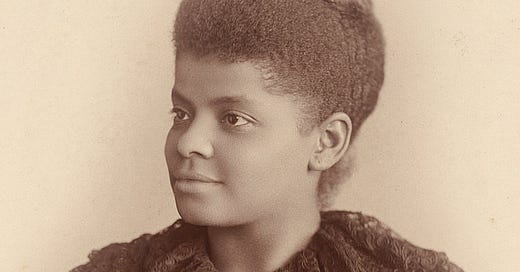Ida Bell Wells was born on July 16, 1862, in Holly Springs, Mississippi, shortly before emancipation. In her early years, Ida was surrounded with politics as her father was interested in political affairs and would discuss them with friends at home. Her mother taught Ida the importance of discipline, teaching her to take care of home responsibilities from a young age.
But tragedy struck early for Ida and her family. In 1878, her parents and youngest brother died from a Yellow Fever epidemic ravaging the region. Family members wanted to split the surviving kids between foster homes. Ida adamantly rejected the idea. While grieving the loss, Ida chose to become responsible for her other five siblings. She dropped out of Rust College and took a job teaching.
"I came home every Friday afternoon, riding the six miles on the back of a big mule. I spent Saturday and Sunday washing and ironing and cooking for the children and went back to my country school on Sunday afternoon," Ida would say. During the week, her grandmother helped care for the kids.
Early Activism
A pivotal moment in Ida's life occurred in 1884. Ida had purchased a first-class ticket for travel by train from Memphis to Nashville. However, the train crew demanded that she move to the car designated for black passengers. Ida refused. The train crew forcibly removed Ida, and she had to take a later train. Infuriated by the incident, Ida sued the railroad company and initially won a $500 settlement, though the Tennessee Supreme Court later overturned the decision.
After this incident, Ida began her journey as a journalist. She wrote of the experience and then began writing about other topics. When she wrote articles criticizing the school system, she lost her teaching position. At that point, Ida began focusing on her journalism work full-time.
Journalism Career
"Brave men do not gather by thousands to torture and murder a single individual, so gagged and bound he cannot make even feeble resistance or defense." - Ida B. Wells
As a journalist, Ida was assertive, opinionated, and unafraid to be controversial. She followed a belief that "the way to right wrongs is to turn the light of truth upon them."
In 1892, in the still early years of Ida's journalism work, she learned about the lynching of a friend, Thomas Moss, and two of his co-workers, Calvin McDowell and Lee Stewart, in Memphis.
Keep reading with a 7-day free trial
Subscribe to Historical Snapshots to keep reading this post and get 7 days of free access to the full post archives.




